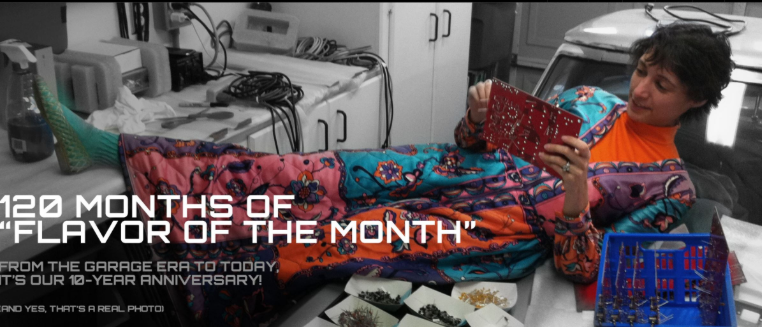Chapter 23:
“I Didn’t Know People In the Private Sector Were As Lazy and Incompetent As the People In Schools”
I’ve already mentioned some “invisible lines” in business—hiring your first employee, getting your own production space, etc. Well, here’s another: hiring your first employee who won’t directly be producing products.
Yes, your first manager.
I can hear the groans now. Well, I hate to break it to the fans of completely flat organizations, but yes, some management is necessary. That is, if you ever want a snowball’s chance in a blast furnace of ever having a life. If you ever want to take some time off, have a vacation, or do any of those things that non-workaholic people do, you’ll need management that ain’t you.
Why? Because, believe it or not, you can’t do everything.
Repeat that again:
you can’t do everything.
No, let’s turn that up:
you shouldn’t do everything.
Now, before you all think I’ve become some tool relaxing on a beach, espousing the benefits of outsourcing every part of your business and life so you can sit on your ass some more, building your empire on a cloud of of a temporary situation in which some places in the world offer very low-cost labor, relax.
Similarly, if you’re thinking I’m going to be retiring to the CEO’s giant office, reclining in a $6000 Italian-leather office chair, foregoing the day-to-day work, and focusing on creating dream-team org charts while the company is mismanaged into non-existence by the direct reports under the dream team, oh
hell no to that as well.
No. Let’s be clear. We’re not talking about a billion-dollar “hey, I won the VC/startup/etc lottery” mass-market business here. We’re talking niche. We’re talking niches where people get up in arms about the tiniest decisions you make. We’re talking an environment where micro-social will dissect everything we do.
Get out of your business and you kill it.
Hire a “dream” CEO to run your brilliant idea, and it’s dead meat.
Ignore the nuts and bolts and focus only on a “vision,” and you might as well throw in the towel.
But, at the same time, this doesn’t mean you have to do
everything. Which means hiring people with responsibility, intelligence, and the ability to make a decision. Call them “managers,” “smart dudes,” “team leaders,” or what-have-you, but you will need them to do things you can’t do, don’t have the time to do, or don’t want to do.
But this is a massive change. Once you’ve hired someone in management, you’ve now put on direct overhead. You have a salary that isn’t totally dedicated to pushing products out the door.
It’s a gigantic change. To put it simply:
once you’ve hired a manager, it’s a real business, not a hobby.
Jason’s Thoughts on Business Management, or, Saving Face Before I Get My Ass Kicked By Flat Organization Fans
Now, before we get any further let me be perfectly clear about how I feel about management layers in a business: they’re a necessary evil. Extra layers should be avoided at all cost. Like nuclear waste, you don’t want to get too much management on you.
The problem is, the vast, vast majority of businesses in the USA have far too much management. Instead of treating it like nuclear waste, they treat it like an all-you-can-eat free buffet…the more, the merrier.
How much management is too much?
- How about a 150-person company with 17 vice-presidents?
- What about an 80-person company with 65 in management and 15 in production and shipping?
- How about a 200-person company with 6 layers of management: C-Level, EVP, VP, Director, Senior Manager, Manager—with anyone below the EVP level unable to make decisions on expenditures that cost more than $1000?
Yep, been there, seen all that. And lots more.
Why do companies have too much management? Three reasons:
- The 20/80 rule, or hiding in a crowd. When a company reaches a certain size, and the founding management checks out of the day-to-day reality, it’s very easy for groups to form where 8 out of 10 people are simply hiding in the crowd, and only 2 people are actually doing the work. Solution: add a manager. All too often from the 80%, though.
- The “ain’t my job” CYA factor. When something new and scary is thrown at a company running the 20/80 game, the natural reaction of most 80%ers is to run away. It might fail. They don’t want to get that on them. (Seriously, at my first corporate job at Magnavox, I was pulled aside by the Senior Team Leader and told very simply, “Never volunteer. It makes us look bad. And you’re working too fast.”) Good thing there was a manager and senior manager above him, before the department head and then the “real” engineering management.
- Title inflation. How do you make someone feel good if you don’t want to give them a raise? How about a fancy title? Yeah. It really is that simple.
Mike and I took the titles of “Co-Founder” when we started Schiit, rather than “CEO/President” for the simple reasons of:
- They describe accurately what we are
- They set no limits on what we can or should do
- They are about as anti-inflationary as they can get
So, to this day, and into the foreseeable future, Mike and I are as hands-on as we want to be, or need to be. Mike directly designs pretty much all of the digital products. I do pretty much all of the analog products. When digital problems come up, Mike solves them. When analog problems come up, I solve them.
Will we some day have engineers working with us doing some of that? Maybe. But I don’t see us getting out of those arenas entirely, or anytime soon.
Similarly, I do the marketing and the product cosmetic design. Will I get out of that? Probably not completely. But will I hire a marketing person to deal with the mechanics of ads, shows, etc, and to beat off the ad salespeople with a stick? You bet. But not now. Not yet.
So what don’t we do?
Well, Mike and I are both what you’d call “administratively challenged.” We’re not good at detail. Rely on us to make sure the parts show up on time, that we build the right mix of 115V and 230V units, or even that we get to the right show on the right date…hmm. Maybe. Maybe not.
Or to put it in more typical business language: we clearly need help in operations. And that brings us to our first management hire...
Let's Meet Another “Ideal” Candidate
Okay, let’s first set the scene. About the time I start thinking, “Hey, I need someone who can do more than test and assemble,” we’re not even yet in the Schiithole. It’s very close, though. Imminent. And I’d really like to have someone in there, ASAP, someone who isn’t Rina, Mike, or me.
At the same time, we’re starting to think really hard about the Mjolnir and Gungnir launch. Which means the workload was going to get even bigger. The days, longer. Compounding this, Rina’s own business was taking off, so she had less time to devote to Schiit.
We needed to hire someone. At least to help with shipping. But I really wanted more—someone who could grow into our lead operations guy. Call him the Proto-COO, or Future Director of Operations, or whatever title sounds appropriate. But I knew we needed someone who was much more than a clerk.
That’s when Rina had a brilliant idea.
“Hire Alex,” she said. “He could run this whole business.”
“Alex?” I asked.
“Jen’s husband.” Jen was Rina’s friend from way back. They’ve written books together. Currently, they’re producing a web series (necrolectric.com). I knew Jen. I’d met Alex before, but I wasn’t intimately familiar with his background. I remembered something about computers, but that’s about it.
“What does he do?” I asked.
“He’d be perfect! And it would be great. And they’ve always wanted to move out here.”
“Wait.” I remembered that Jen and Alex lived in Hesperia. To those not familiar with California, that’s a hell of a commute to Newhall—about 90 minutes one way…with no traffic.
“But he could start part-time,” Rina pressed. “He wouldn’t have to come out here every day…”
I shook my head. “Part-time,” and “operations,” don’t really go together. And anyone who was willing to do part time…
“What’s he doing now?”
Rina frowned. “I told you. He was an assistant principal at—“
Rina kept talking, but I didn’t hear her. Every negative stereotype of someone who’d worked in the school system came clamoring to the fore, shouting for attention.
They were overpaid. Lazy. They could never make it in private industry. They’d fold in a second and run back to the land of fat, tax-funded pensions.
But at the same time, I remembered talking with Alex—and he was sharp.
“Um,” I stalled.
“He really would be perfect!” Rina said. “I know it!”
“But…”
“And when they’re living here, it’ll be even better.”
“I really don’t know about this,” I told her.
“You should give him a chance…”
I knew where this was going. I didn’t want to argue, so I pretended that I had something to do (or maybe I really did have something to do) and begged off of making a decision.
Out of the Frying Pan…
But Rina kept hounding me. And that’s how, shortly after we took possession of the Schiithole, I found myself talking to Alex over breakfast with Lisa and Jen.
And…you know what? Alex was sharp.
What’s more, he didn’t flinch when I spelled out exactly how it had to be, to start: he’d be a contractor, not an employee. The hours might be a little sketchy, depending on demand. The place he’d be working in was not a palace. He was going to die in the summer heat. And he’d be having to learn the ropes of audio—an insanely picky, somewhat neurotic, completely unique market that he had no deep experience in.
No. Instead, Alex asked reasonable questions, like when we’d end up switching to salary (soon, I was already getting nervous about the “contractor” definition, and I knew it had to go), opportunity to move up (there is no ceiling, I told him the story of Mike and Centric and creating our first interactive department from nothing). And the story of Theta and its bonuses.
And, during that breakfast, I began to get the feeling: Alex may just be one of those diamonds in the rough, like Eddie and Tony…but on a much more functional frequency. He was clearly smart enough to get in and understand our operations.
But was he? Those old prejudices about people who worked for schools kept nagging.
It didn’t matter. It wasn’t like Mike and I were going to be organized enough to put together a help-wanted ad and screen the applicants. It would be easier to do the “sink or swim” thing again, just like we’d done with Tony and Eddie.
So what did we do? I said something like, “You want to get started now?”
That afternoon, Alex was helping pack and ship Valhallas at the garage. From there, he helped us move all the crap out of the garage into the Hole, then trained with Rina on Mondays, Wednesdays, and Fridays for the next couple of weeks.
After that, it was pretty much the Alex Show.
Alex determined that we needed more racks for better segregation of finished goods—so he went out and bought them. He decided to reorganize the packing and loose parts. He cleaned up the Schiithole to the point where it was much more livable. He oversaw the installation of a security system, told us when we were running out of space, found a place with mobile storage units, and added one in the back. He let Eddie know what to build and Tony what to test. After some short training with me, he took over a lot of the part ordering. He didn’t complain, even as the days got hotter and his hours got shorter because things were slow.
And he did this all while he and Jen were looking for a house out here, closing the deal, and he was spending his evenings renovating the house, as well.
And that, my friends, is what initiative looks like.
Alex was the perfect candidate. Rina was entirely right.
Now, Alex got to interact with a lot of our vendors—the metal house, the PCB house, the electronic parts suppliers, the packaging guys…and I think this was a revelation to him in more ways than one:
- Revelation One: he didn’t have to fill out 50 pages of paper to buy $500 worth of stuff. I’d just say, “If you want it, get it.”
- Revelation Two: his own assumptions about private business were about as lacking as my own about people who work in schools.
One day, as we were finally shipping Mjolnir and Gungnir (after we’d gone through a couple of rounds of metal incompetence, and Alex had helped us work through them), Alex said something that still stands to this day as The Greatest Schiit Quote of All Time.
He said:
“You know, before I started this job, I had no idea people who work in private industry were as lazy and incompetent as the people who work in the school system.”
I busted up.
But I couldn’t help thinking:
wow, that’s a turnaround from my own prejudices.
“When I was working at the school,” Alex continued, “That’s all they ever told us: that we’d never make it in the private sector. That we were so lucky to have these jobs. If we ever lost them, our lives were over.”
“They actually told you that?” I asked.
Alex nodded.
“Wow.” I shook my head.
“But I get out here, and what do I find? The same bozos.”
I laughed. “Yeah, being part of a private company doesn’t mean anything. Especially in marketing. You know what we used to say about marketing?”
“No,” Alex said.
“You go into marketing because you’re not smart enough for science, and not ruthless enough for sales.”
“Ouch.”
“Yeah. And probably about as true as everyone in the school system being lazy and incompetent. The thing is, everything’s a continuum. There are sharp people and not-so-sharp people everywhere.”
“I’m still looking for the sharp ones,” Alex told me.
“Good. We’ll need them.”
And that really is
the challenge, more and more: not letting your company fall to the 20/80 rule, where a handful of good people do most of the work. Not letting the bozos on the bus.
And, to this day, Alex has helped us do that. He oversaw the move into, and build-out of the space we’re in today. He spec’d the racking and forklift we needed. He set up the shop layout so it would be more efficient. He’s helped us work through half a dozen new product start-ups, and made decisions to hold back on shipping until he was happy with what we are making. He brought on the extra people we need for customer service and for shipping. And he’s overseeing the buildout of extra space right now, as I write this. All transparently, without hours of micromanagement from me and Mike, and without us second-guessing everything he’s doing.
In short, without Alex (or someone very much like him) we would not have been able to grow as effectively. Schiit would have been much more of a burden on the day-to-day side. We probably wouldn’t have been able to launch as many new products as we have, nor the flood of new stuff that’s coming.
That’s why you hire (good) management. Because it makes things better all around.
Note the (good). Because accepting mediocrity isn’t acceptable. Nor is sitting back, crossing your arms, and saying, “You know, we’re doing pretty well.”
Bottom line: you can’t tread water. You can’t stand still. You have to sacrifice your babies. You need to look straight-on at cannibalizing your own products. You always have to be asking, “What can we do better, less expensively?” Even if it lays waste to your entire lineup.
Because, you know what?
If you don’t do it, someone else will.




























 You need people who will be responsible for different technical detailed aspects of the business to help the visionaries keep it all pulled together: the micro-oriented folks that the macro-oriented folks can use to keep all the cats in one sack.
You need people who will be responsible for different technical detailed aspects of the business to help the visionaries keep it all pulled together: the micro-oriented folks that the macro-oriented folks can use to keep all the cats in one sack.